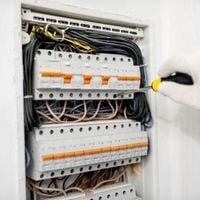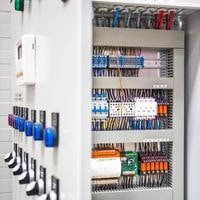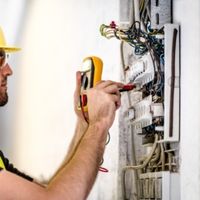Electrical panel location rules. An electrical panel is a type of electrical board. It is sometimes even referred to as the Distribution Board. The function of the electrical panel is simple.
It is used to divide the electrical power feed that is given to subsidiary circuits.
A simple electrical panel usually comprises bus bars, major breaks, and some circuit breakers. The electrical panel can also be found in fuses instead of circuit breakers.
The main breaker performs the duty of limiting the current that is entering the circuit from the outside.
Electrical panel location rules
The instructions given according to NFC provide us with simple rules. There must be accessible working space around the distribution board.
The breaker must be 6’6 high at the very least. Its distance from the wall should be 3 feet square.
Its width should be 30. This is to allow the door of the electrical panel to be opened easily, and no problems would arise during working.
Location requirements for electrical panel
The basic requirements of electrical panel installation are the same as that of the rules that are listed above, but let us further obtain knowledge about them.
Installation height
The height of the panel installed from the ground should be 4 feet.
Exceeding limit
The requirement is simple, and the other requirement related to this rile is that the electrical panel should not be installed more than the height of 6 feet from the ground.
Required opening space
Another requirement for the installation of the electrical performance in a good state is that it can at least be opened at a complete angle of 90 degrees. This will allow us to work properly and easily.
Places for the installation of the electrical panel
In actuality, the electrical panels are installed anywhere you want or like them to be. But you should vary the places you install them. An example is that you install the electrical panel in the living room.
The living room is typically the place most people remain in their house. You may also have children there.
And while you left them in the room to get something, they might just touch the wrong board or put their fingers on the board. That will not be a pleasant sight. You can imagine the consequences.
The places at which an electrical panel can be installed
So the place where the electrical panel should be installed is the place where there is not much rush of traffic. The place where the board is out of the reach of children.
A place like these is usually the storerooms or the basements of your houses. These places are not visited by children either, as you just need to lock the door.
The requirements and the rules should be followed for safety.
Common problems associated with electrical panels
- The most common problem is that if we locate it in a difficult place, e might not be able to reach it in the time case of a problem.
- The 2nd problem is that if it is located in a place, we rarely go. We won’t know the condition that our electrical panel is in, maybe it might be damaged.
- Another problem is that if we have not seen the board, we won’t know if the equipment is new or old. As modern problems require modern solutions, we might need to upgrade the electrical panel.
FAQs
What is typically the best place to install the electrical panel?
The best place to typically install the panel is placed in your house, where there is less traffic. These places can be some kind of store or places like your basement. In case you live in an apartment, you can use the hallway to install it.
Can you change the location of the electrical panel?
The answer is simply yes. To suit your needs, you can change the location of the electrical panel to your desired location. Though I warn you, that is very time-consuming and not a simple task.
Conclusion
The places where you install the electrical panel entirely depend on you. You can even put it in places as common as kitchens.
The rules are just for your safety and the safety of your family. Following them will only be helpful to you, but not following them might sometimes cause problems, as I mentioned above.
Related Guides


